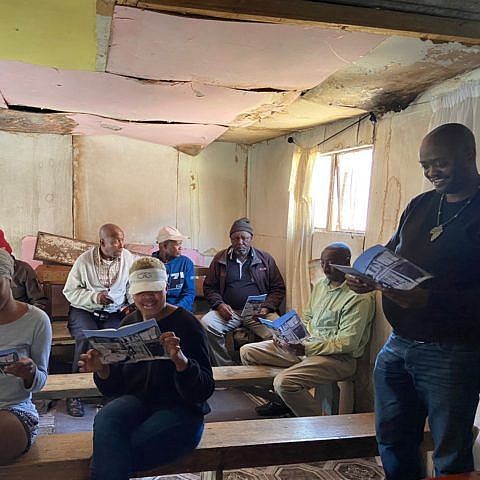Collaborative Immersions in the City of Cape Town






Geetika Anand | 2022
In the first part of City Immersions: Methods and Research Practice, students of Critical Urbanism from Basel University and students of Southern Urbanism from University of Cape Town come together to participate in a collaborative research studio. The studio explores housing and service delivery issues, their expression in policy and their everyday lived realities in the city of Cape Town. The studio is carried out in partnership with People’s Environmental Planning (PEP), an NGO that works to solve stalled housing projects. Over the last few years, PEP has been working with the informal settlements in the Western Cape province to take the Western Cape Informal Settlement Support Programme (ISSP) towards implementation. This year’s studio was based in a cluster of four small informal settlements, located in Khayelitsha neighbourhood of Cape Town. The studio took place at a strategic moment: PEP had recently started working in these settlements and was very keen to co-develop and implement service delivery projects in as many of these settlements as possible. In addition to understanding the living conditions in these settlements, the studio also became an entry point for PEP to build relationship with the residents.
The aims of the studio work were three-fold: (1) to document overall living and livelihood strategies, and dynamics of daily life (how families survive); (2) to produce research reports that can act as bridging documents for the discussions between PEP and settlement residents, and enable them in planning for next steps; and, finally, through the studio, the students had a chance to experiment with social science research methods and writing strategies and to explore in practice approaches to collaborative, partnership-based research, a key element of rigorous southern urban work.
The studio started with a set of orientation talks to set the context of Cape Town; its spatial history and legacy of apartheid; policy changes in the human settlements sector in South Africa; as well as PEP and its objectives. Thereafter, four groups of 2-3 students were made to undertake research in each settlement. The groups were formed in a way to have both Basel and UCT students in each group as well as a mix of disciplinary backgrounds. During the research phase, students partnered with atleast two researchers from each of the settlement, which was facilitated by PEP. We had four weekly research days (every Wednesday) in March 2022. Mornings were spent in settlements doing interviews and mapping while afternoons were on UCT campus reflecting on conversations had and observations made. Students also kept a weekly journal to record their experiences in detail and reflect upon them. At the end of the fourth research session, reflection session was organised in Khayelitsha to collectively reflect on the research process and findings with settlement researchers and PEP. Students, thereafter, collated their research materials and turned interviews into narratives. These draft narratives were checked with the residents before working on final reports. Settlement-wise reports were produced in the end, which included the individual and family narratives, emerging themes, and reflections on possible next steps. Continuous hard work of residents in making their structures and these settlements what they are today was visible throughout. Issues of service delivery, tenurial security, and safety, and a desire for permanent housing resonated across the settlements. Printed copies of these reports were shared back with the residents of these settlements. In addition to workshopping these reports and next steps with residents, PEP also intends to use these reports as a resource to have conversations with the Councillor and City of Cape Town officials to figure out ways to improve the living conditions in these areas through upgrading.
In nutshell, the studio proved to be a unique opportunity to contribute to the urban practice of settlement upgrading through collaborative research while learning (by doing) at the same time.
- Read More
Quick Links
Social Media






